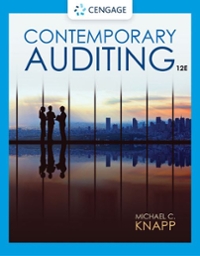Bill, will you have that inventory memo done by this afternoon? Yeah, Sam, it's coming along. I
Question:
Bill, will you have that inventory memo done by this afternoon?" "Yeah, Sam, it's coming along. I should have it done by five, or so." "Make it three . . . or so. Okay, Bub?" Bill responded with a smile and a nod. He had a good relationship with Sam Hakes, the partner supervising the audit of Marcelle Stores.
Bill DeBurger was an in-charge accountant who had 18 months experience with his employer, a large national accounting firm. Bill's firm used the title "in-charge" for the employment position between staff accountant and audit senior. Other titles used by accounting firms for this position include "advanced staff" and "semi-senior." Typically, Bill's firm promoted individuals to in-charge after one year. An additional one to two years' experience and successful completion of the CPA exam were usually required before promotion to audit senior.
The title "in-charge" was a misnomer, at least in Bill's mind. None of the in-charges he knew had ever been placed in-charge of an audit, even a small audit. Based upon Bill's experience, an in-charge was someone a senior or manager expected to work with little or no supervision. "Here's the audit program for payables. Go spend the next five weeks completing the 12 program steps . . . and don't bother me," seemed to be the prevailing attitude in making work assignments to in-charges.
As he turned back to the legal pad in front of him, Bill forced himself to think of Marcelle Stores' inventory-all $50 million of it. Bill's task was to summarize, in a two-page memo, 900 hours of work that he, two staff accountants, and five internal auditors had done over the past two months. Not included in the 900 hours was the time spent on eight inventory observations performed by other offices of Bill's firm.
Marcelle Stores was a regional chain of 112 specialty stores that featured a broad range of products for do-it-yourself interior decorators. The company's most recent fiscal year had been a difficult one. A poor economy, increasing competition, and higher supplier prices had slashed Marcelle's profit to the bone over the past 12 months. The previous year, the company had posted a profit of slightly less than $8 million; for the year just completed, the company's preaudit net income hovered at an anemic $700,000.
Inventory was the focal point of each audit of Marcelle's financial statements. This year, inventory was doubly important. Any material overstatement discovered in the inventory account would convert a poor year profit-wise for Marcelle into a disastrous year in which the company posted its first-ever loss.
Facing Bill on the small table that served as his makeshift desk were two stacks of workpapers, each two feet tall. Those workpapers summarized the results of extensive price tests, inventory observation procedures, year-end cutoff tests, an analysis of the reserve for inventory obsolescence, and various other audit procedures. Bill's task was to assimilate all of this audit evidence into a conclusion regarding Marcelle's inventory. Bill realized that Sam Hakes expected that conclusion to include the key catch phrases "present fairly, in all material respects" and "in accordance with accounting principles generally accepted in the United States of America."
Questions
1. What conclusion do you believe Bill DeBurger reached in his inventory memo? Put yourself in his position. What conclusion would you have expressed in the inventory memo? Why?
2. Would you have dealt with your uncertainty regarding the inventory account differently than Bill did? For example, would you have used a different approach to raise the subject with Sam Hakes?
3. Evaluate Sam Hakes’ response to Bill’s statement that he was unable to sign off on the inventory account. In your view, did Sam deal with the situation appropriately? Was Sam’s approach “professional”? Explain.
4. Is it appropriate for relatively inexperienced auditors to be assigned the primary responsibility for such critical accounts as Marcelle Stores’ inventory?
Step by Step Answer:






